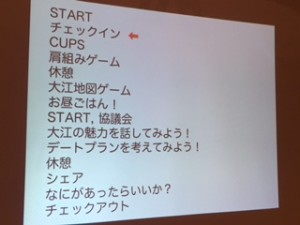Archives
The 13th Forum on Collaborative Education between High School and University is now available.
The next 14th Forum on Collaborative Education between High School and University is scheduled to be held in December. We will inform you as soon as the details are decided, so please join us.
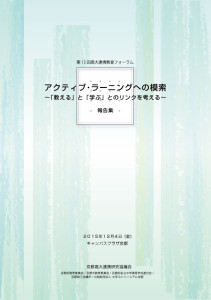
Contact us
University Consortium Kyoto High School-University Collaborative Education Forum
TEL 075-353-9153 FAX 075-353-9101
〒600-8216 Shimogyo-ku, Kyoto-shi, Nishitoin-dori, Shiokoji, Shimo-ku, Kyoto, Campus Plaza Kyoto
* Business hours: Tuesday ~ Saturday 9:00 ~ 17:00 (excluding year-end and New Year holidays)
【Application has been closed】 The 19th Kyoto International Student Film Festival is now accepting submissions! (~5/22)
【Business Overview】
The Kyoto International Student Film Festival is the largest international student film festival in Japan and is now in its 19th year. Films and videos directed by a wide range of students, both in Japan and overseas, are solicited in a competition format, and the selected films are screened at the Kyoto International Student Film Festival (held in November) and the best films are awarded.
Historically, Kyoto is a “movie town” that still inherits the cultural heritage of the early days of Japan cinema, and it is also a “university town and student town” where students account for 10% of the population of Kyoto City. The purpose of this festival is to create a place for international exchange and mutual understanding among student filmmakers and filmmakers, as well as to discover and disseminate new talents who will support the film industry in the future from among the many possibilities of student filmmakers.
We are currently accepting submissions for the festival’s competition (live-action and anime). We are looking forward to receiving many listings.
*For details, please check the application guidelines on the official website.
≪ Competition Entry ENTRY≫
■ Recruitment Division: Live-action Division, Anime Division
■ Application period: Tuesday, March 22, 2016 ~ Sunday, May 22, 2016
*Must be postmarked on the day of Japan time
■ Period: Late November 2016 (tentative)
■ Entry fee: Free
■ How to apply: Media mailed (BD-R and DVD-R)
or data submission (limited to works of 30 minutes or less)
★ Click here for the official website of the Kyoto International Student Film Festival (application guidelines)
★ Listing fee is free! Click here for the WEB entry
[We are also looking for student executive committee members to run the film festival!] 】
[Last year: Overview of the 18th Kyoto International Student Film Festival]
① ②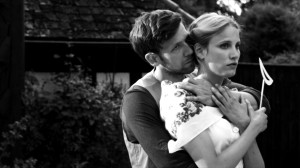
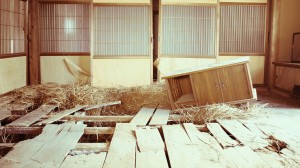
③ ④ ⑤ ⑥




Grand Prix
(1) Live-action “The Bad Old Us” / Directed by Lily Erlinger / Filmakademie Baden-Wurttemberg (Germany)
(2) Anime Division “The Name of the House” / Director Nao Sakagami / Tokyo University of the Arts Graduate School (Japan)
Final Jury Prize
(3) Sayoko Kinoshita Prize “Fidelity” (Germany)
(4) Lee Fengyu Prize “Goron, Batan, Kyu” / Directed by Tamaki Yamamoto / Osaka University of Arts (Japan)
(4) Shuichi Okita Prize “Goron, Batan, Kyu” / Directed by Tamaki Yamamoto / Osaka University of Arts (Japan)
Audience Award
(4) Goron, Batan, Kyu / Directed by Tamaki Yamamoto / Osaka University of Arts (Japan)
Special Mentions
(5) “100 apples” / Directed by Chia-Yao Wang / National ChengChi University (Taiwan)
(6) “Laughter in the Dark” / Directed by Marta Trela / Lodz Film School (Poland)
< Related Sites>
18th Kyoto International Student Film Festival Grand Prix Winner Announced!
[< Reference> Introduction of Past Selected Artists]
・Yuya Ishii’s “Rebel Jiro’s Love” (2006, 9th selection)
/ “Weaving a Boat” (released in 2013)
・ Eihiro Fukagawa’s “Zenriki Bombaye!” (1999, 2nd selection)
/ “Midnight Journey” (released in 2011)
・Tatsuo Kobayashi× Aya Watanabe (screenplay) “Boy and Town” (2007, 10th Grand Prix)
“Country Girl” (released in 2011)
Destin Daniel Cretton (co-director) “DEACON’S MONDAYS”
(2007, 10th Prize, from the United States)
/ “Short Term” released in Japan in 2014
It has won 30 film awards worldwide and has been nominated for 50 film awards.
– Patrick Vollrath’s “KetchupKid”
(2014, 17th Grand Prix for Short Film, Germany) Nominated
for Best Live Action Short Film at the 88th Academy Awards.
【Contact】
The 19th Kyoto International Student Film Festival Executive Committee
〒600-8216 Shimogyo-ku, Kyoto-shi, Nishitoin-dori, Shiokoji Shimoru Campus Plaza Kyoto
TEL: 075-353-9430 (Closed on Mondays) FAX: 075-353-9101
E-MAIL: info ■ kisfvf.com (Please change ■ to @ and send) HP
: http://www.kisfvf.com/
The results of the analysis related to the 27th “Citizen Life Realization Survey” have been announced!
We will publish the results of the analysis of the “Citizen’s Life Perception Survey” conducted as part of the “Future Kyoto Creation Research Project” jointly implemented by the University Consortium Kyoto and Kyoto City.
As part of the Kyoto City Policy Evaluation System, the “Survey on Citizens’ Perceptions of Citizens’ Lives” is conducted to grasp the extent to which the policies and measures listed in the city’s basic plan are being achieved. It can be used by those who are engaged in community development activities.
In light of the fact that this fiscal year marks the fifth year since the survey began, we are conducting an analysis from the perspective of trends over the past five years, including a special feature on how citizens’ lives have changed significantly over the past five years.
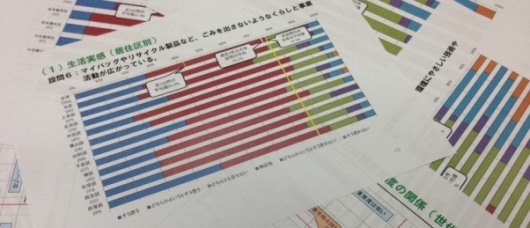
On this page, the data is summarized in a booklet with a summary of the analysis results, and the details are posted as a reference edition.
As in previous years, the results of the survey on the perception of life by generation, gender, and residence for all 130 items in all 27 policy areas, the results of the survey on the importance of policies in all 27 policy areas, and the correlation between the perception of life and the importance of the policy are posted.– Correlation between living conditions and happiness by residence, and correlation by occupation and number of years of residence
– Analysis results by residence, occupation, and number of years of residence in free description
– Status of responses to the Survey on Citizen Life by Residence, Occupation, and Number of Years of Residence
・Responses by residence of the perception of life, importance of policies, interest in city government, and happiness
We are focusing on the following: Please take a look.
What can we learn from the analysis?
– What kind of life do citizens have in each policy area, and how important do they think it is?
・ How is the transition of the 5 years of Heisei 23 ~ 27 in the actual life of citizens?
– From the correlation between the level of experience in daily life and the importance of the policy, what is the public’s perception of the current policy and its effects?
・ What kind of policy areas will improve the sense of happiness when the sense of life improves?
– What are the potential needs of citizens that appear in the content of free writing?
Data in the analysis results (summary booklet)
Analysis results related to the 27th “Citizen Life Realization Survey” Overall [Click here for details]
Reference: List of 130 questions in all 27 fields about how to feel about life [Click here for details]
Special Feature: Items that have significantly changed the way citizens feel about their lives over the past five years [Click here for details]
I. Discussion by Policy Area [Click here for details]
For all 27 policy areas, what can be seen from the results of responses to the actual perception of life and policy importance is described.
II. Analysis using statistical analysis methods Overall [Click here for details]
1 Changes in the relationship between policy importance and life perception in FY25~27 [Click here for details]
2 Correlation between generations and gender in the perception of life and happiness [Click here for details]
(1) Characteristic questions in this year’s response results
(2) Questions that were correlated across a wide range of attributes
(3) Analysis of correlations by policy area
It describes about.
3 Analysis of free text [Click here for details]
III. Outline of the 27th Citizen Life Survey Document 1
IV. Results of responses to the questionnaire on the perception of daily life, the importance of policies, the level of interest in municipal government, and the feeling of happiness Overall [Click here for details]
・Status of responses by generation and gender of life Affiliation Appendix 2
・Status of responses by generation and gender of policy importance Appendix 3
・Ranking of the percentage of positive responses in terms of life and policy importance (city-wide) Appendix 4
・Gender response status of interest in city government by generation Appendix 5
・Status of responses by generation and gender of happiness Appendix 6
Literature
The following items are posted as materials.
(1) Citizens’ perceptions of daily life, policy importance, and correlation between them in each of the 27 policy areas
Bar charts show the level of life and policy importance, and scatter plots show the correlation between the two.
1 Environment 2 Human Rights and Gender Equality 3 Youth Growth and Participation
4 Civic Life and Communities 5 Safety of Civic Life 6 Culture
7 Sports 8 Industrial and commercial 9 Tourism
10 Agriculture and Forestry 11 Universities 12 Internationalization
13 Child-rearing support 14 Welfare for persons with disabilities 15 Community welfare
16 Welfare for the elderly 17 Health and hygiene and medical care 18 School education
19 Lifelong Learning 20 Walking Town 21 Land Use and Urban Functional Arrangement
22 Landscape 23 Architecture 24 Houses
25 Roads and greenery 26 Fire and disaster prevention 27 Water for daily life
(2) Correlation between living conditions and happiness by residence, occupation and years of residence
For questions that show a relationship between an increase in a sense of life and an increase in a sense of happiness, you can see the characteristics of each occupation by residence and the number of years of residence.
By Residence, by occupation and number of years of residence
(3) Results of analysis by residence, occupation, and number of years of residence in free-form writing
It offers a glimpse into the potential needs of citizens with separate residences。
By Residence, by occupation and number of years of residence
(4) Status of responses to the Survey on Citizen Life by Residence, Occupation, and Years of Residence (Supplementary Material 1 of the Summary Booklet)
You can see the change in the number of respondents to the citizen life survey in FY23~27.
By Residence, by occupation and number of years of residence
(5) Status of responses by residence to the Survey of Citizens’ Perception of Life (Summary Booklet Material 2~6 Supplementary Materials)
Feeling of life, Policy importance, level of interest in city government, and response results by residence of happinessI understand.
Inquiries
University Consortium Kyoto Research & Public Relations DivisionTEL 075-708-5803 FAX 075-353-9101
〒600-8216 Shimogyo-ku, Kyoto-shi, Nishitoin-dori, Shiokoji, Shimo-ku, Kyoto, Campus Plaza Kyoto
* Reception hours: Tuesday ~ Saturday 9:00 ~ 17:00 (excluding year-end and New Year holidays)
About the results of the implementation of “Maruttoku in Oe”
Outline of Implementation
|
schedule |
Friday, March 11, 2016 ~ Saturday, March 12, 2016 |
|
|
place |
Kyoto Prefectural Oe High School, Japan Demon Exchange Museum, Oeyama Green Lodge |
|
|
sponsorship |
Kyoto High School-University Collaborative Research Council (Kyoto Prefectural Board of Education, Kyoto City Board of Education, Kyoto Prefectural Federation of Private Junior and Senior High Schools, Kyoto Chamber of Commerce and Industry, University Consortium Kyoto) |
|
|
cooperation |
Oe Regional Tourist Information Club, Oe Town Development Council, Kyoto Prefecture Northern Regional and University Cooperation Organization, Base Planning Co., Ltd. |
|
|
participant |
High School Students |
28 (total) |
|
university student |
10 |
|
|
working adult |
15 (total number of people) |
|
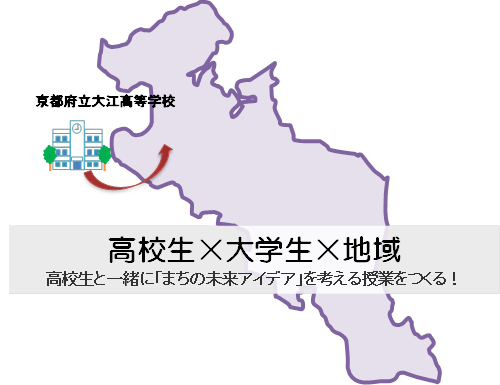
About “Maruttoku 2015” [Click here for details]
Implementation Report
It was planned to be a place to talk, listen to, and share ideas for the future of the town in the Oe region.
In order for university students to learn about the Oe region in advance, we incorporated “Machi Araki” with the cooperation of the Oe Regional Tourist Information Club and interacted with local people.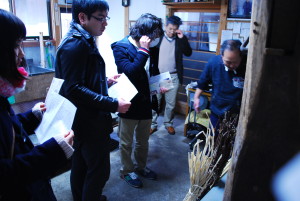
●Planning Time Schedule
|
11th(Fri) |
9:10 |
Departure from Nijo Station |
|
11:45 |
Lunch and student team building |
|
|
12:45 |
Machiariki |
|
|
14:30 |
University Student Team Building |
|
|
16:00 |
Roundtable discussion with high school and university students |
|
|
19:30 |
Exchange meeting between local people and university students (Oeyama Green Lodge) |
|
|
12th(Sat)
|
9:00 |
Workshop started (Demon Exchange Museum) |
|
17:00 |
Departure from Oe |
|
|
19:30 |
Arrival at Nijo Station |
[Flyer for high school students created by university students]
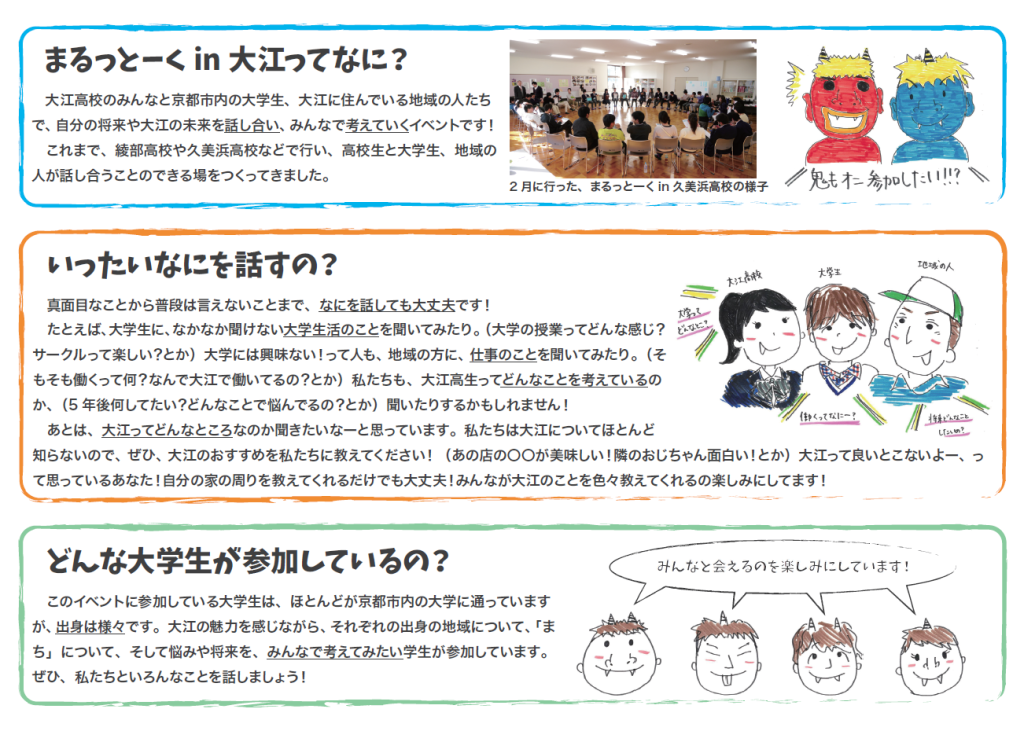
Taking advantage of the “town area” on the first day and the interaction with local people, in the workshop on the second day, through work to draw the shape of Oe and to think about a date plan, “What would be nice to have in Oe, what is wonderful now?” We came up with ideas for town development.
The members of the community development council who participated in the workshop said, “I want to receive ideas and opinions that I have never thought of and make the most of them,” and “I want to hear the voices of high school students more and more.” I received the impression.
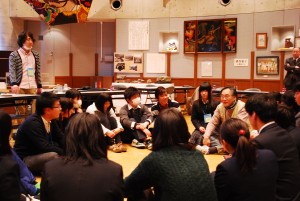
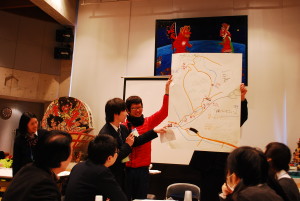
A high school student who experienced interaction with local people at this workshop said, “I was thinking that if I went to university, I wouldn’t come back to my hometown, but as I listened to today’s story and learned about the various merits, I realized that it is not easy to divide.” I was able to gain a regional and social perspective for future planning.
In addition, when I saw the university students involved as facilitators, I felt that my desire to go to university was strengthened. I was inspired.
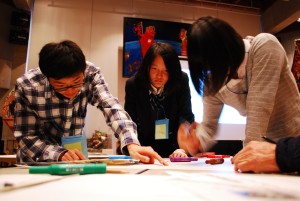
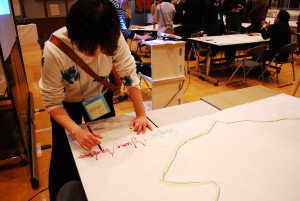
The university students who participated in the event said, “If you take an interest in the area, the local people will do their best to return the favor. That’s what I learned.
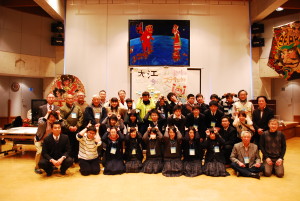
The Kyoto High School-University Collaborative Research Council conducted a questionnaire survey of the participants of this workshop and summarized the extent to which it influenced the skill development of high school and university students, as well as the impact on cultivating social and regional perspectives.
About the results of the questionnaire [Click here for details]
Contact us
Public Interest Incorporated Foundation University Consortium Kyoto High School University Collaboration
TEL 075-353-9153 FAX 075-353-9101
〒600-8216 Shimogyo-ku, Kyoto-shi, Nishitoin-dori, Shiokoji, Shimo-ku, Kyoto, Campus Plaza Kyoto
* Reception hours: Tuesday ~ Saturday 9:00 ~ 17:00 (excluding year-end and New Year holidays)
About the results of the implementation of “Maruttoku in Kumihama”
Outline of Implementation
|
schedule |
Thursday, February 11, 2016 |
|
|
place |
Kyoto Prefectural Kumihama High School |
|
|
sponsorship |
Kyoto High School-University Collaborative Research Council (Kyoto Prefectural Board of Education, Kyoto City Board of Education, Kyoto Prefectural Federation of Private Junior and Senior High Schools, Kyoto Chamber of Commerce and Industry, University Consortium Kyoto) |
|
|
cooperation |
Kyotango City Yumemachi Souri University, Kyoto Prefecture Northern Regional and University Cooperation Organization, Base Planning Co., Ltd. |
|
|
participant |
High School Students |
22 |
|
university student |
15 |
|
|
working adult |
8 |
|
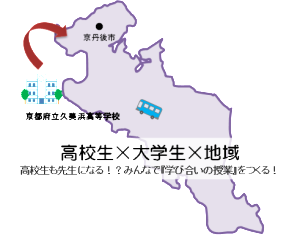
About “Maruttoku 2015” [Click here for details]
Implementation Report
“High school students will also become teachers!? With an emphasis on “high school students talking,” we challenged participants to compose their own life histories in order to gain the strength to take a step forward toward the future of the participants and the future of Kumihama.
The high school students’ stories about the future based on past events and current experiences were full of pride and hope for the Kumihama area. In this way, from the stories of high school students who were affectionate for the Kumihama area, the university students felt that “the brightness of high school students is unique to what they want to do,” and the local people left the impression that “I felt that I should do my best by listening to the solid opinions of the high school students.”
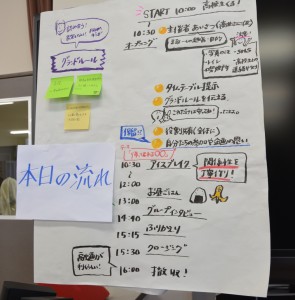
This workshop was planned and run by 15 university students.
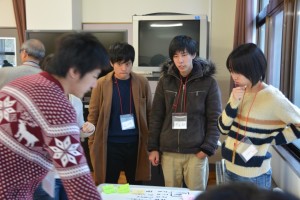
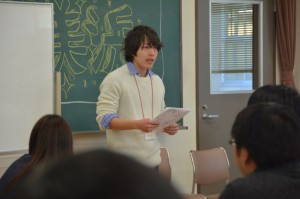


Attracted by the keywords “community,” “education,” and “high school students,” the university students gathered at a training camp in Kumihama from the day before and organized a workshop for the day. Most of the university students were new to each other that day, but they showed great team strength and leadership skills in order to achieve the goals they had set.
On the other hand, the high school students realized the importance of the ability to step forward, saying, “I wanted to move forward without giving up” and “I want to be like the university students who came today” by asking university students and local people about their dreams and hopes.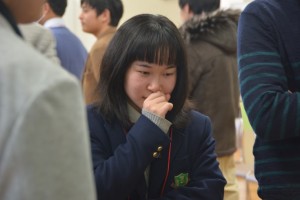
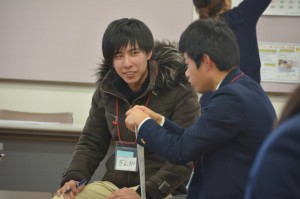
We were able to create such a place for “mutual learning” without the cooperation of the local community, who listened carefully to the high school students and warmly watched the activities of the university students. “It makes me happy when I hear young people say, ‘I want to go back to my hometown,’ and I want to do my best to connect that to a concrete vision.” As the saying goes, it was also a place for local people to “learn from each other”.
The Kyoto High School-University Collaborative Research Council conducted a questionnaire survey of the participants of this workshop and summarized the extent to which it influenced the skill development of high school and university students, as well as the impact on cultivating social and regional perspectives.
About the results of the questionnaire [Click here for details]Contact us
Public Interest Incorporated Foundation University Consortium Kyoto High School University CollaborationTEL 075-353-9153 FAX 075-353-9101
〒600-8216 Shimogyo-ku, Kyoto-shi, Nishitoin-dori, Shiokoji, Shimo-ku, Kyoto, Campus Plaza Kyoto
* Reception hours: Tuesday ~ Saturday 9:00 ~ 17:00 (excluding year-end and New Year holidays)
Report: The 16th Kansai Roundtable Meeting of Support Personnel for Students with Disabilities (KSSK)
The 16th Kansai Disability Student Support Officer Roundtable Meeting
On March 3, the Kansai Disability Student Support Officer Roundtable (KSSK) was held at Campus Plaza Kyoto, with the aim of interacting with people in charge of disability support at universities in the Kansai region.
For the 16th time, we invited the person in charge of actually providing support from Wakayama University and Ryukoku University, which have developed support systems for students with disabilities over the past few years, to talk about the current situation and issues in the field. In addition, the subcommittees were divided into two groups each on the three themes of “Support Practices,” “Career Support,” and “Support Systems (Guidelines, etc.),” and exchanged opinions on how to support students with disabilities in small groups.
Perhaps due to the influence of the Act on the Elimination of Discrimination against Persons with Disabilities that will come into effect in April 28, 70 people participated, exceeding the originally planned capacity of 60 people, including not only disability support staff, but also educational staff and career managers. While the participants received positive comments such as “It was good to hear about the specific development of the system because there were issues with support and maintenance” and “Since it was a subcommittee of the same size university, there were many common issues and it was very helpful,” while others expressed their awareness of future issues, such as “I want to know how to support practical training” and “How can I gain the understanding of faculty and staff?”
We will continue to plan and consider the meeting so that it functions as a place for various universities, departments, and personnel to exchange opinions and interact. The next meeting is scheduled to be held around September 2016. Once the content of the event has been decided, it will be announced on the website of the University Consortium Kyoto.
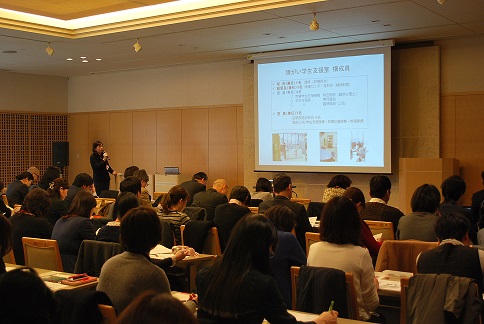
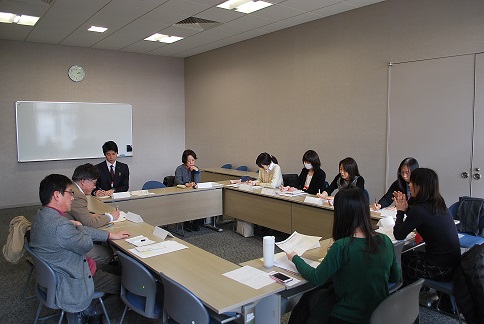
Providing topics about the university’s initiatives In the subcommittees, the people in charge share their worries with each other.
About the Support Program for Students with Disabilities
The 16th Kansai Disability Student Support Officer Roundtable
2016 Kyoto College Kyoto Studies Course 3/12 (Sat) Special Lecture “Machikado God Mr./Ms. / Buddha Mr./Ms.”
2016 Kyoto College Kyoto Studies Course “Kyoto’s Cultural Heritage: Japan’s Treasures for the Future”A special course will be held as an opening project. In the special lecture, there will be a lecture by Ms. Takamiko Reizumi, the wife of the Reizumi family, who is descended from the “Uta Sei” of the Heian and Kamakura periods, Fujiwara Toshinari, and the Sadake family, and a dialogue with Professor Toru Yagi of Bukkyo University. Admission to this commemorative course is free and no registration is required. We look forward to your participation.
Saturday, March 12, 2016 [Participation is free, no registration required]
Special Lecture “Machikado God Mr./Ms. and Buddha Mr./Ms.”
Lecturer: Ms. Takamiko Reizumi, Executive Director, Reizumi Family Tokiutei Bunko
(Dialogue) Toru Yagi, Professor, Faculty of History, Bukkyo University
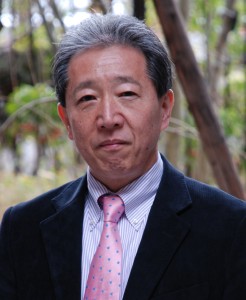
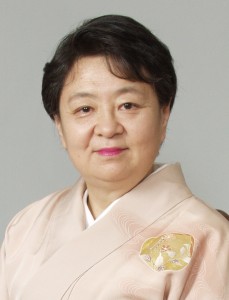
Ms. Takamiko Reizumi Mr. Toru Yagi
Kyoto’s cultural heritage is famous for its shrines and temples, such as Heian Jingu Shrine and Kiyomizu-dera Temple, but we must never forget that the common people living in Kyoto cherish the shrines and Mr./Ms. in each town. It is the Shunseisha that enshrines Fujiwara Toshinari. The Mr./Ms. of the Machikado gods and the Buddha Mr./Ms. are small and nameless, but they have a history of being protected by the townspeople for generations. Isn’t this the underlying strength of Kyoto’s culture?
◆Time: 13:30 ~ 15:00 (Venue 13:00)
◆Venue: Campus Plaza Kyoto, 4th floor, Lecture Room 2
◆Capacity: 250 (first-come, first-served basis)
Apply for Kyoto College Kyoto Studies Course [here]
University Consortium Kyoto Miyako College (except Sundays and Mondays)
〒600-8216 Shimogyo-ku, Kyoto-shi, Nishitoin-dori, Shiokoji Shimoru Campus Plaza Kyoto
Tel: 075-353-9140 Fax: 075-353-9121
We will hold a 27th “Gakumachi Collaboration Project” debriefing session!
Kyoto City and the University Consortium Kyoto will hold a report session on the “Gakumachi Collaboration Project (University Regional Collaboration Creation and Support Project)” to support efforts for regional revitalization implemented in collaboration with universities, students, and the local community.
At the debriefing session, the 14 business organizations selected this year will look back on their activities so far and present the results of their efforts.
Why don’t you find new possibilities for collaboration between the university and the community and hints for regional revitalization from the reports of accreditation projects by students, such as regional development through the inheritance of local customs and traditions?
In addition, a recruitment briefing session for the next year will be held at the same time on the day of the event.
If you are considering applying, please take this opportunity to participate.
In addition, on the day of the event, we will hold an opinion exchange meeting and a networking event with visitors.
It is free to come and go, and anyone can participate, so please feel free to join us.
Heisei 27 “Gakumachi Collaboration Project” report meeting
| Date & Time | Sunday, March 27, 2016 10:00~17:00 |
| Venue | Campus Plaza Kyoto, 5th Floor, Lecture Room 1 / Hall 2nd Floor (939 Higashi-Shiokoji-cho, Nishitoin-dori, Shimogyo-ku, Kyoto) [Access] 5 minutes walk from Kyoto Municipal Subway, JR, Kintetsu Kyoto Station |
| Flow of the day | 10:00 ~ Heisei 27 Certified Business Report Meeting * 1 Presentation @ 13 minutes (including questions and substitutions) 14:40~Heisei 28 business recruitment briefing session 15:00~Opinion exchange meeting, exchange meeting 16:30~Critique and Award Ceremony 17:00 End (tentative) * Please see here for the detailed schedule ↓↓↓ “Heisei 27 Gakumachi Collaboration Project Report Meeting Schedule” |
| Occupancy | 200 (80 for opinion exchange meetings and exchange meetings) *All are on a first-come, first-served basis. * If the capacity is not reached, we will accept applications on the day. |
| Participation Fee | free |
●Click here for the information flyer
⇒ Flyer announcing the debriefing session.pdf
●Click here for details of our business
⇒ https://www.consortium.or.jp/project/seisaku/gakumachi
●Click here for last year’s event
⇒ https://www.consortium.or.jp/project/seisaku/gakumachi/2014-1
Registration
Applications are being accepted from Thursday, February 18, 2016 ~ Saturday, March 26, 2016.
If you would like to participate or attend the lecture, please apply using the application form below.
Inquiries and applications
University Consortium Kyoto Gakumachi Collaboration Project
TEL :075-353-9130 FAX: 075-353-9101
MAIL:gakumachi-admin-ml■consortium.or.jp
(Please change ■ to @ and send)
〒600-8216 Shimogyo-ku, Kyoto-shi, Nishitoin-dori, Shiokoji, Shimo-ku, Kyoto, Campus Plaza Kyoto
* Reception hours: Tuesday ~ Saturday 9:00 ~ 17:00
【Application Closed】Call for Participants for the 15th World Conference of Historical Cities Youth Forum
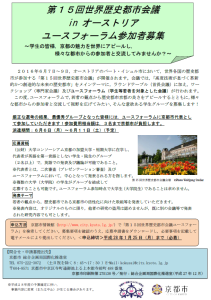
From June 7 to 9, 2016, the 15th World Conference of Historic Cities will be held in Bad Ischl, Austria, with the participation of historical cities from around the world.
As part of this effort, a conference for students and other young people called the “Youth Forum” will be held, where we will appeal to the merits of the historical city of Kyoto from the perspective of young people, and we will recruit motivated student groups who want to broaden their horizons by interacting with participants from various cities.
Why don’t you participate in the Youth Forum as a representative of Kyoto City, promote the charm of Kyoto to the world, and interact with participants from various cities?
We look forward to receiving your application.
(Participants will be selected through a strict screening process.) )
Eligibility
Students must be enrolled in a member university or junior college of the University Consortium Kyoto, and must be able to give presentations and discuss in English in a group (2 or more students) whose representative is not English as their first language.
* The representative refers to the person who will play a central role in the second screening (presentation screening) and the youth forum.
* It is also possible for students from multiple universities (graduate schools) to form a group and apply.
*Students are not required to be university students (graduate students) at the time of participating in the Youth Forum.
* Download the application guidelines (PDF) and application form (Word) *
Application Period
Friday, December 4, 2015 ~ Monday, January 25, 2016
Presentation Themes
From the perspective of young people, they will present their efforts to revitalize the historic city of Kyoto.
Please feel free to set the theme of your presentation, referring to the theme of the 15th World Conference on Historical Cities below.
< main theme>
“Smart, innovative, creative historical cities of the future”
(An innovative and creative historical city of the future with advanced technology)
< sub-theme>
①“Development of tourism to promote city identity”
(Tourism Policy for Improving the Rating of Cities)
②“Creating livable smart historical cities”
(A historic city where you can live forever)
③“Engaging citizens including young people to plan for the future”
(Active Involvement in Urban Planning by Citizens, Including Young People)
* The content of the presentation must be original, and plagiarism of other people’s research is not permitted.
* Research content that has already been presented at another conference is acceptable.
schedule
Application submission deadline: Monday, January 25, 2016
Notification of the results of the first screening (document screening): Mid-February 2016 (tentative)
Second screening (presentation screening): Early March 2016 (tentative)
Notification of the results of the second screening: Mid-March 2016 (tentative)
The 15th World Conference of Historical Cities Youth Forum: June 7 (Tue) ~ 9 (Thu), 2016
*The actual dispatch period is scheduled for June 6 (Mon) ~ 11 (Sat), 2016.
How to apply
Please check the application guidelines, fill out the application form, and submit it by e-mail.
Destination: Kyoto City General Planning Bureau, Internationalization Promotion Office kokusai@city.kyoto.lg.jp
Inquiries and application submission
Kyoto City General Planning Bureau Internationalization Promotion Office
〒604-8571 488 Kamihonnoji-maecho, Teramachi-dori, Nakagyo-ku, Kyoto
TEL 075-222-3072 FAX 075-222-3055
E-Mail: kokusai@city.kyoto.lg.jp
Kyoto City Information Center HP: http://www.city.kyoto.lg.jp/sogo/page/0000191385.html














